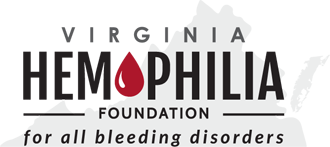March is almost over and we need $2,600 more to go to meet our goal of $6,000! Thank you so much to all who have supported our community during Bleeding Disorders Awareness Month. Your special gift to VHF this month will support our scholarship programs, including the Lyman Fisher Scholarship and the Terry Lamb Enrichment Scholarship! Go here to donate today.
The Krecek Family has been part of the VHF community for many years, and their oldest son, Alexander, has been a deserving awardee of the Lyman Fisher scholarship from VHF, funded from amazing donors like you. Alexander Krecek, 2021 Lyman Fisher Scholarship Recipient, was grateful for the financial support in order to pursue his dreams:
“This scholarship means a lot to me because it will help me continue my studies at a school that actually allows me to major in something that I am truly passionate about. Every little bit helps relieve some of the stress that the rising costs of going to college brings with it.”
The Kreceks are also VHF Hope Society donors – learn more about why the work of VHF motivated them to become monthly donors.
What motivated you to become a monthly donor to the VHF Hope Society?
Our family has been impacted directly by hemophilia. We believe that it is important to support non-profit organizations on an on-going basis to enable their mission (and this is one whose mission we feel is very important)
How will you celebrate Bleeding Disorders Awareness Month?
We like to share awareness of bleeding disorders all the time. In particular for this month, it will be great to share messages through social media and remind people that a portion of our Angel Konfections chocolates goes to support VHF (and Camp Holiday Trails).
What impact has the VHF scholarship program had on your life?
When Jeff served on the Board, he felt that the scholarship program was a great way to engage kids with VHF. We have personally benefitted from having our oldest son be a recipient of the scholarship for one of his semesters at college.
How are you and your family affected by bleeding disorders?
Our youngest son, Nick, was born with severe hemophilia A. Christine’s brothers were also both born with hemophilia A, as well as one of her nieces. Yes, it’s very unusual for a girl to be born with hemophilia, but it is possible when the defective gene takes over (gene lyonization). Because of our family history, when we got pregnant with our oldest son, we did some genetic counseling and testing and spoke with the HTC. The test showed that Christine carries the defective gene, so we knew our child had a 50% chance of being born with hemophilia. We discussed precautions and immediate plans for testing for hemophilia as soon as the baby was born with our doctors and the HTC. Turned out our oldest son did not have hemophilia, but our youngest did.
Your family has been very involved with the chapter. Can you talk a little bit about anything you have gained from that involvement?
The HTC told us about the VHF annual meeting that was happening in Charlottesville (where we live) when our son was about 7 months old. We were excited to connect with other families that had similar experiences. It made us feel like we were part of a large family or community. Although we had known about VHF through Christine’s brother (who participated in the chapter after he became an adult), we had not been involved before. Growing up, Christine’s family had not chosen to be part of the hemophilia community, so she did not know anyone else with a bleeding disorder. We wanted to make sure our children had that sense of community and became immediately involved with the chapter. As a result, we and our children have friends they have known their whole life and we have shared support with many other community members.
What do you wish that people knew about the bleeding disorders community?
We wish people outside the community understood that bleeding disorders is a life-long condition that impacts the whole family. Whether you are the person with the diagnosis or not, everyone is affected (both good and bad). Just because you are impacted by the diagnosis, it does not mean you are defined by it. As a family and a community, we can also come together to do a lot of good. Despite all of our society’s advances in technology and communication, bleeding disorders are still rare enough to be misunderstood or completely ignored by most people. With more awareness, more people might be diagnosed earlier with a bleeding or clotting disorder. And the more you know, the more you can do about it.
